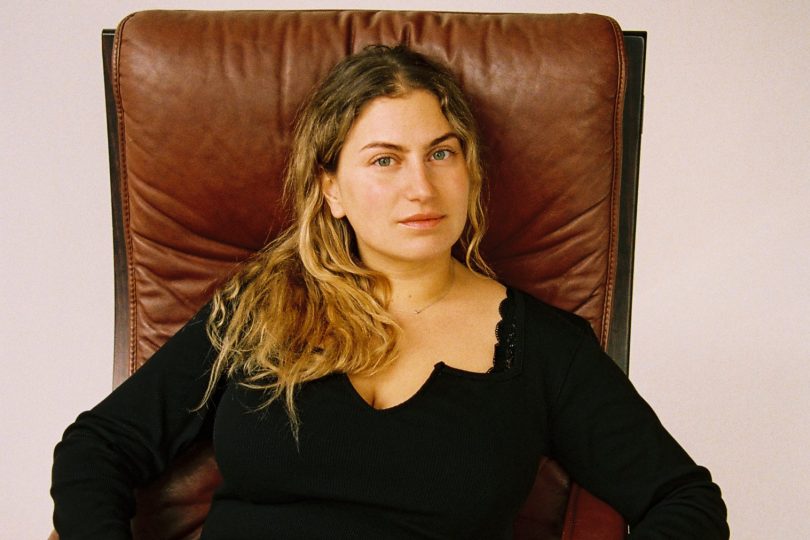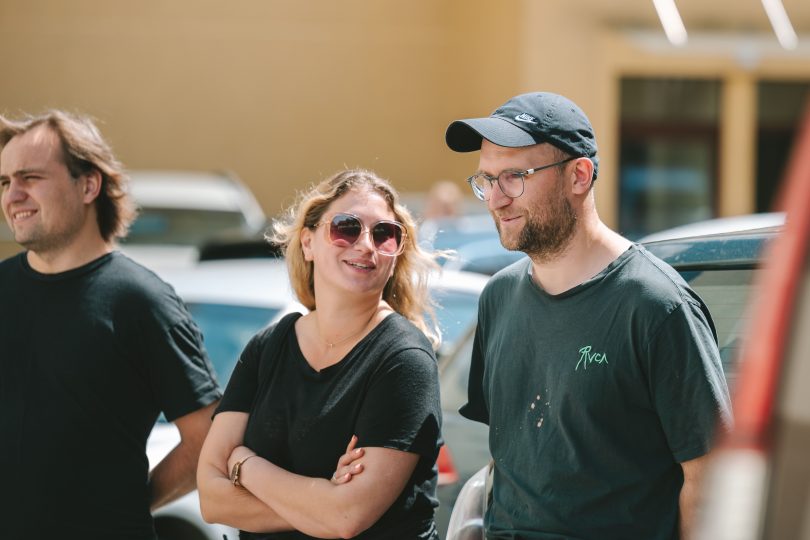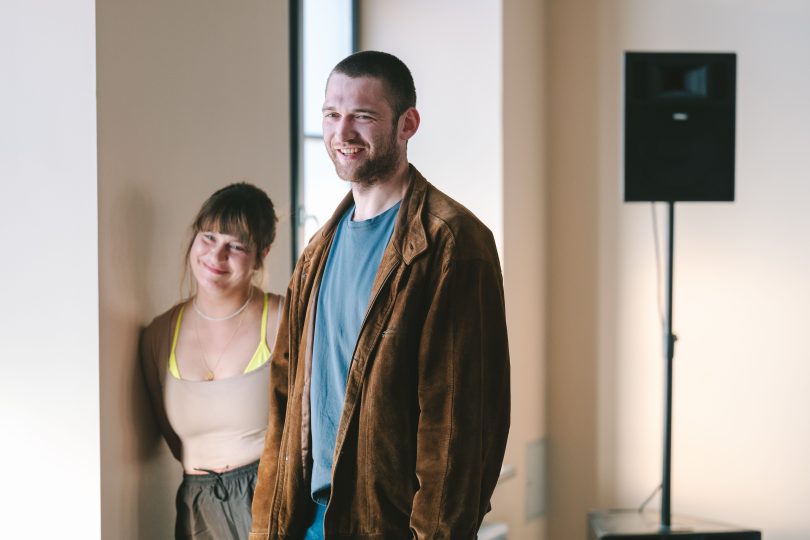Director Marija Kavtaradze's world-traveling intimate love story "You don't remind me of anything" is coming to Lithuanian cinemas next week, on September 22. In the film, Elena, a contemporary dancer, meets Dovydas, a sign language interpreter, and their platonic relationship gradually turns into a romantic one. When David reveals that he is asexual, the two are determined to find their intimacy together.
Before the national premiere of the film, the director Marija Kavtaradze talks about the creation of the film, imperfect people and their relationships, the enchanting chemistry between the characters of the story, and reveals which simple question the audience will never be the same after the film.
Maria, what is the movie "You don't remind me of anything" about for you?
About love, of course (smiling). But love - a very broad topic, and I wanted to explore it with this film our imaginations and attitudes about how love and relationships are supposed to develop. So for me this movie – about relationships and stories that don't necessarily fit into the box and don't necessarily meet our or others' expectations. By the way, we often don't know the expectations of another person either, we just try to imagine them according to our own. And then you can see how difficult it is to let that love in, when there are already a lot of created imaginations in your head.
The film is also about different physical needs. About how they can affect our relationships with other people, and even our own relationship with our bodies. And also about romantic expectations, gender roles or the need to be fulfilled through passion and sex. And above all, the film is about self-acceptance and being honest with yourself and others.

Khow was this love story born and when, while you were developing it, did asexuality appear in it?
Asexuality has been interesting to me for a long time - I read a lot about it, I carried it in my mind for a long time. It seems to me that this topic reveals very nicely how different we all are. In general, the topic of physicality covers a lot, not just about sexuality or how it creates intimacy in relationships, but also about our own relationship with our bodies. He, for example, can be the source of our distrust.
So, in the end, I realized that it will be a love story, a relationship story about characters who themselves and their needs are very different, but equally important. They try to guess each other's needs and each offers something that they themselves may not really want at all. Well, the main character of the film is not even them, but their relationship.
The characters of the film have to discover and give their own meanings to the concepts of fidelity, masculinity, jealousy. So the audience also has a chance to rethink many "self-evident" things?
Really so. Their relationship was a puzzle to me, a mathematical problem that I had to solve. Therefore, while writing the script and for myself, I had to rethink everything I thought about relationships until now, question everything that is "obvious" and established.
It seems to me that there are so many clichés in both stories and in our heads, not because that's the way life is, but because we hear the same things being told over and over. And I want to see different people and relationships on the screen. I'm tired of seeing the same lifestyle of people everywhere. There's nothing that can't happen in a movie - everything happens in life.

Both film critics and viewers agree that the connection and chemistry between the main characters is simply enchanting. How did you manage that?
Because Greta Grinevičiūtė and Kęstutis Cicėnas are great actors! From the first meeting with them, I felt that the three of us would have fun working together. And that was one of the main reasons why I chose them to play the pair of main characters. I think that's where the chemistry came from. Simple, often even household things help to create something that sometimes cannot be described in words. In order for chemistry to happen, and especially the kind of chemistry we created in this film, everyone needs to feel safe.
And after the selection, we had a lot of time - two years. So we kept coming back, improvising, and it inspired me to highlight or change some details based on them. Greta and Kęstutis contributed a lot of their creativity. Although they are very different, they have something in common - they are wonderful partners on set.
The movie makes the viewer enter into the intimacy of the characters - sometimes feel as if you are in the same room. But at the same time respect is maintained. How did you manage to maintain that balance? Do you think the female gaze helped you tell the story with respect for their intimacy?
In intimate scenes, it was more interesting for me to delve into feelings, rather than to eroticize them. I felt close to my characters and I didn't watch them from the side, but I just spent time with them. In addition, all scenes, including intimate ones, are in the film for a reason, each one plays its role. They all helped me tell the story of their relationship.
While designing, I thought a lot about the female and male gazes. Even the movie talks about it in a way. The male gaze is what Elena misses the most - and it's not even sex itself, but her desire to feel wanted.
As the film travels around the world, you have already met many viewers. Which of their impressions do you remember the most?
I received so many comments and even private messages that people felt understood and that the film moved them deeply. For me, this is one of the most beautiful assessments. Various people who have been in various relationships recognize themselves in the film. And they openly share with me not only their impressions of the film, but also start talking about their relationships. So during this period I listen to a lot of personal stories about love and sex (Marija smiling).
And it is also interesting and quite funny that many viewers remembered and recognized themselves in the episodes with McDonald's. For many, after the movie, the invitation "let's go to McDonald's?" will apparently acquire new meanings (laughing).

________
The film "You don't remind me of anything" has already toured international festivals in Istanbul (Turkey), Sydney (Australia), Karlovy Vary (Czech Republic), Taipei (Taiwan), "Atlantida" ( Majorca, Spain), "New Horizons" (Wrocław, Poland), Durban (Republic of South Africa) film festivals, and will soon travel to the international film festival "Love and Anarchy" in Helsinki (Finland), the BFI London Film Festival and that - just the beginning. The film is a Lithuanian contender for the Oscar, and the European Film Academy selected it for the list of works competing for nominations for the European Film Awards.
Probably, the most anticipated Lithuanian film of this year will be available in Lithuanian cinemas from September 22. Lithuanian movie trailer: https://www.youtube.com/watch?v=Ky_I3UnalPw. In the film "Tu man niko nepremeni" the main roles are played by Greta Grinevičiūtė and Kęstutis Cicėnas, the director of the film Marija Kavtaradze is also the author of its script, the cinematographer: Laurynas Bareiša, the artist: Sigita Šimkūnaitė, the producer: Marija Razgutė ("M–Films") . The production of the film is partially financed by the Lithuanian Film Center, it is being co-produced with Spain and Sweden.
This film is the second full-length work of Marija Kavtaradze. Her first work, Surviving the Summer (2018), had its international premiere at the Toronto Film Festival, and later, after gaining acclaim at home, the film traveled to many international festivals, won audience and jury awards, and was acquired by a number of foreign TV and home theater platforms. .
Look for movie screenings in Romuva here.
Film screenings with SKN subtitles here.

